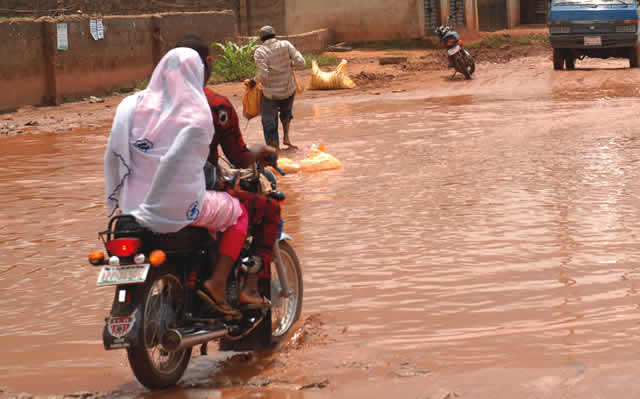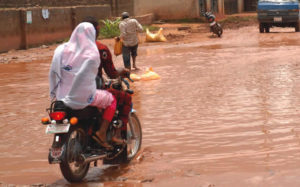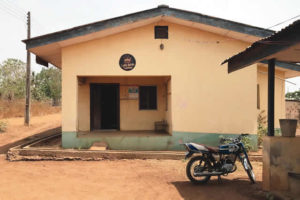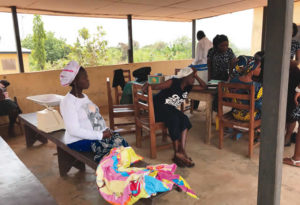News
Touching Stories Of Pregnant Women In Osun Community Who Die, Lose Pregnancies Seeking Antenatal Care

JESUSEGUN ALAGBE reports about Ife -Odan , a community in Ejigbo Local Government Area of Osun State , where a number of pregnant women have lost their lives while travelling several kilometres on motorcycles to access medical care and give birth to their babies
Around 11 am on one windy day in February in Ife – Odan, Osun State , Olusola Adeniran sat on a wooden bench under a decrepit shed , with long – drawn – out doleful eyes which spoke of his grief , the four- year- old pain he had been bearing . He had tried several times to stop thinking about the incident , but to no avail . The memory kept coming back , like a musical track put on a repeat.
The incident occurred on a Friday in February 2014 when his pregnant wife , Romoke , started squealing in pain . They both knew it wasn ’ t time for her delivery , the pregnancy was six months old . But when the pain became unbearable , Olusola bundled her onto his motorcycle , off to Ejigbo , a major neighbouring town which is 25 kilometres away. ( The journey from Ife – Odan, a border community between Osun and Oyo states to Ejigbo on a motorcycle , takes approximately 40 minutes) .
Barely 15 minutes as the couple rode on the motorcycle on the tarred road leading to Ejigbo , an oncoming car , while overtaking an 18 – seater bus , colluded with the Adenirans’ motorcycle , knocking them down . Thankfully , the driver of the car stopped and carried the badly injured couple to a hospital in Ejigbo .
“ My wife bled throughout while we were in the car and later became unconscious ; I too had bruises all over my body , ” Olusola, 38 , said , showing our correspondent one of the scars that he sustained on his neck . The scar would always remind him of his wife , he said as few hours later after arriving in the hospital , “ My wife died with the baby . I was thrown into mourning . ”
He added, “ Since that day , I have never been happy , we were just three years old in marriage and she was pregnant with our first child . It was not the first time I would carry her on a motorcycle to Ejigbo ; I had always done that for her anytime she had her antenatal class .
“ I don ’ t think I can ever forget losing my pregnant wife to an accident ; it would have been better if I was the one who died in the accident while she survived and brought forth our child . I loved Romoke and I ’ m not sure if I can find a woman like her again . ”
Olusola noted that he would never have thought of risking the life of his six – month – old pregnant wife, carrying her on a motorcycle on a distance of 25 km , but for the unavailability of good health care facilities in the community.
“ If we had just one good General Hospital in Ife – Odan , it would be good for our pregnant women , but we have none , hence , we take them to far places where they can get better medical care . And now , this has caused my wife ’ s death, ” he complained .
Risky journeys
In Ife – Odan, to access better health care services, findings by our correspondent showed that pregnant women travel all the way to Ejigbo [ 25 km distance ]; or Oyo , Oyo State [ a 23 km distance ]; or Iwo, Osun State [ a 54 km distance ]; or Ogbomoso , Oyo State [ a 58 km distance ] .
But the journeys are risky , especially as they are mostly done on motorcycles , the main mode of transportation in the community and the main source of income for most men .
“ Many of us own motorcycles here ; this is a poor community, so just very few people own cars . We take our motorcycles everywhere , ” said Moses Akande, who is a teacher – cum -motorcycle operator in the community. “I teach during the day and in the evening I use my motorcycle for commercial purposes. ”
On the day our correspondent travelled to Ife – Odan from Ejigbo on a motorcycle , on a tarred road lined by mango and cashew trees , the weather was windy, and as buses and trucks sped by , the winds they blew made the motorcycle shaky , and twice the rider almost rode into a ditch .
“ Don ’ t worry , we won’ t fall , ” he assured our correspondent, using his left hand to adjust his helmet and goggles .
Meanwhile , this was a journey that Ife – Odan’ s pregnant women regularly take, costing some of them their lives in the process .
For instance , 43 – year- old Bukoye Adeeyo ’ s countenance changed as he spoke of his wife, Kemi, who died of pregnancy complications on December 21 , 2010 . She was about five months pregnant then .
Some pregant women being attended to at the community ’s health centre
Kemi had gone to the farm the previous day with her sister to fetch some firewood for sale and for cooking. But while she was in the farm , she fainted while trying to use her cutlass to clear the bush .
Telling the incident , Bukoye said , “ It was my wife’ s sister who called me on the phone that day that my wife had collapsed , so I had to rush back home from Ejigbo , where I had carried a passenger to . By the time I got back to Ife – Odan some minutes later , she had opened her eyes , but she still wasn ’ t feeling okay .
“ She started complaining of her stomach and so I mounted her on my motorbike and went to a nurse in this our town . After giving her some drugs and there was no improvement , she said we should start rushing her to a General Hospital in Ogbomoso . My wife , her sister and I mounted on the motorcycle again and went to Ogbomoso . We eventually got to the hospital and she was admitted. ”
However , it was rather too late .
“ I don ’ t know what the doctor said was wrong , but he said the nurse we first took her to shouldn ’ t have given her the drug she gave her . I can ’ t even remember the name of the drug . But to cut the long story short, my wife died a day later , ” Bukoye cried softly, “She was going to give birth to our second child , but I lost her . If there is a General Hospital here , it might have saved her . We wouldn ’ t have had to travel to Ogbomoso for her treatment . ”
Asked why he didn ’ t hire a vehicle to convey his wife to Ogbomoso so she could get to the hospital on time and receive medical care promptly , Bukoye said it was “ expensive” to get one .
“ Getting a car is too expensive, and you can ’ t even get a vehicle just like that ; most people here rely on motorcycles for transportation , ” he said .
In 2017 , Mrs. Bunmi Bolaji , who was deaf and dumb , also lost her life while seeking medical care .
She had been attending her antenatal classes at Ejigbo , but she was eventually discouraged by her family from travelling the distance due to the risk involved .
However , choosing to stay and receive care in a community that lacked quality health care professionals and facilities also turned out to be a bad outcome for her and her family .
Her elder sister, Gbemisola, shared Bolaji ’ s pathetic story: “There are quack nurses here who call themselves doctors . She stopped going to Ejigbo and started her antenatal care at a private clinic here , and in June 2017 , she was eventually delivered of her child .
“ But two weeks after delivery , she said she was having pain and started holding her waist every time . Later , her hands became numb . She couldn ’ t move them. I thought she was playing because she was too playful , but one day , we wanted to give her tea and her hands dropped the cup . Her child was also crying for food and we had to hold the baby for her to breastfeed her .
“ Later , we noticed that she couldn ’ t stand on her feet for a long time again . One of her hands had also become swollen . She couldn ’ t dress herself up ; her eyes were yellowish . We took her to the woman who delivered her of her baby , but after looking at her , she said she couldn ’ t handle her case , referring us to Ejigbo . She was vomiting blood afterwards .
“ When she was taken to the hospital in Ejigbo , she was diagnosed with appendicitis , and we were told she had had it for a long time , but it just manifested . We lost her that day at around 6 pm — on July 24 , a month after she gave birth . The child is alive , though . ”
A Lagos – based gynaecologist , Dr . ( Mrs. ) Bolanle Idowu , said pregnant women travelling on motorcycles were embarking on risky adventures , which might result into loss of pregnancies and their own lives , as could be seen happening to the pregnant women of Ife – Odan .
She said , “ The situation puts the unborn babies in danger should an accident occur and the tummy is hit . It’ s too risky . Jarring the baby around may not be the wisest choice . The risk of an accident on a motorcycle is so much greater than being in a car . Someone might fall off the motorbike and lose the baby and it’ s quite touching that it’ s happening already to some women .
“ I think they have a local government chairman ; such a situation should be presented to him in case he is too unconscious of what’ s happening in his or her domain. They can provide public transport for the women , they can do it. Falling off a motorcycle has serious consequences especially for the foetus . ”
Although Ife – Odan has a Safe Birth Centre in the premises of its Primary Health Care Centre , investigations by
Saturday PUNCH revealed that it was not safe for pregnant women , which is why most pregnant women choose to travel long distance to receive medical care and also be delivered of their babies .
When our correspondent visited the facility , located along an unpaved dusty road, it looked more like a ramshackle home — – with cruddy doors and windows.
Inside , the only items that could be seen was a single bunk , covered with a crumpled blue bedsheet and pressed- down pillow wrapped in a not – so – clean white pillowcase.
There was also no electricity or pipe -borne water in the facility, and the only means of getting water was through the well.
On this day , there were a few pregnant women receiving antenatal classes , especially those who are afraid of travelling long distance to get same; however , all of the women said they would never come to the facility when it was time for delivery .
“ I am afraid of riding on motorcycles , which is why I have come here for my antenatal class . I registered at the State Hospital in Iwo for the antenatal class , but I can ’ t be travelling every time on motorcycles for that kind of long distance , ” said Bisola ‘ Sanjo , one of the pregnant women . “ They only give us paracetamol and Vitamin C tablets here , but I will manage. When it’ s getting to the time of delivery , I will travel to Iwo and stay at my elder sister’ s place. I ’ m lucky; not everyone has a relative at places where there are better health care facilities for pregnant women . ”
‘ Sanjo ’ s fear of riding on motorcycles was proved when she said she trekked for three hours from her house at Araromi , an area in the community, to the Safe Birth Centre .
“ It pays me to trek than to fall off a motorcycle ; there have been several cases like that — of pregnant women falling off while on motorcycles . I don ’ t want to take that risk often , ” she said .
Another pregnant woman, identified simply as Monsurat , said any pregnant woman who wanted to be delivered of her baby at the health centre was taking a “ huge ” gamble .
She said , “ It’ s not advisable ; we just come here for the antenatal classes only , nothing more . When it’ s time for delivery , some of us don ’ t come here . I know most pregnant women travel to Ejigbo and Ogbomoso to give birth to their babies . I too will still go to Ejigbo when it’ s time. There is no reputable hospital here .
“ I think if the government can provide us a State Hospital , we would not need to be travelling far to access quality medical care . It ’ s because we don ’ t have good health care facilities and services here that pregnant women make risky journeys to be delivered of their babies .
“ Some have died in the process because if there are any pregnancy complications that require emergency care , we cannot have the good care here . It’ s painful . ”
Confirming the bad situation of the Safe Birth Centre , the coordinator of the health centre , who is a nurse, Mr . Ibrahim Adebayo , said the centre had at several times informed the local government authorities concerning the poor state of things in the facility ; however , no positive change had evolved.
He complained that there were no drugs in the facility to be given to pregnant women or sick patients who came for treatment , adding that the few materials that the centre had were being supplied by some “ concerned ” non – governmental organisations .
He said , “ It’ s been over a year that our borehole stopped working , so we don ’ t have water . We have informed the local government authorities about the situation and they said they would attend to us . Up till now , nothing has happened . When we need water , we fetch from the well.
“ There is no light here , though it’ s a general problem in the community. The government said it would attend to all these but we ’ ve not heard anything . There are no drugs and we [ workers ] can ’ t use our money to stock the health centre with drugs . We just prescribe drugs to our patients and ask them to go to the pharmacy to buy the drugs.
“ We also don ’ t have enough hands here . [ Our correspondent saw five workers when he visited the facility] . If not for some NGOs which collaborated with us , we wouldn ’ t have had test kits for HIV test and mosquito nets given to pregnant women . In fact , the chairs and benches you see here were supplied by an NGO . ”
The Executive Secreatary of Ejigbo West Local Council Development Area , under which Ife – Odan falls, Mr . Ayodele Adetona , said the council lacked funds to rehabilitate the Safe Birth Centre .
“ We ’ re unhappy about the plight of our pregnant women , but we are expecting some funds from the state government ; once the funds come , we will buy drugs and put the facility in good shape , ” he said .
Before the change comes…
However , before Ife – Odan’ s Safe Birth Centre is put in good shape, more pregnant women would continue to embark upon more dangerous journeys , risking their lives and the lives of their unborn babies .
One of those who had embarked on such journeys and lost her pregnancy [ her third ] in the process is Mrs. Omowumi Ashiru , who relocated to the community with her cleric husband and three children on August 8 , 2015 .
Her husband , a reverend at the Church of Nigeria (Anglican Communion ) , had been posted from Owode , Ogun State to the community while she was two months’ pregnant.
She had given birth to twins with her second pregnancy , but with her third , it was an experience full of pain.
She narrated, “ Few weeks after relocating here , I started menstruating , which lasted for about seven days. The wife of one of the clerics at our church , who is a nurse , said I should go to Ajaawa [ few kilometres from Ogbomoso ] to visit the clinic there. Meanwhile , the main mode of transportation here is motorcycle . I had never travelled on a motorcycle before while pregnant , but I did it here .
“ The matron I met referred me to Ogbomoso . From Ajaawa , we couldn ’ t get a vehicle, so I still had to mount a motorcycle with my pregnancy . Some drugs were prescribed for me, which made me stop menstruating, even though I was still feeling severe pain .
“ Five days after , I woke up in the morning , feeling dizzy. Within few seconds, I slumped and found myself on the floor . I faintly called on my first daughter, EwaJesu , who was then eight years old. My husband had gone to church .
“ I told my daughter to bring my phone, but I couldn ’ t see anything on the screen , everything was blank to my eyes . But few seconds later , I was able to call the neighbour , who rushed back home . By the time she came , she found me naked by the door and rushed me to a clinic where an auxiliary male nurse attended to me . ” Time was 6 am .
Ashiru continued that the nurse then passed a drip on her , while intermittently fainting and waking up on the hospital bed . From that time till 4 pm , she said she didn ’ t feel any improvement in her body , and with her husband then around , she was taken out of the clinic by 7 pm , and taken to the Baptist Hospital , Ejigbo .
But on getting to Ejigbo , the doctor was not around , so she was referred to a private clinic in the town , where she was subjected to a series of scan . Afterwards , she was told that she had ruptured pregnancy . She was thereafter operated upon. This was on September 18 , 2015 .
She lamented , “ Since then , I have not been able to conceive again . If we had a General Hospital in this town , things would be better for pregnant women . We wouldn ’ t have to travel several kilometres to get medical care or be delivered of our babies . I never liked going to the health centre here ; the only drugs they give us are paracetamol and Vitamin C tablets.
“ There was a sad incident that occurred in January 2018 . One of our church members went to be delivered of her baby in the hands of a nurse here . We didn ’ t know how it happened , but the baby ’ s umbilical cord started bleeding for two days after delivery . The baby was born on a Friday, but two days later , he died . Our church member has now gone to Oyo to receive proper medical care . ”
In Nigeria , it is not only in Ife – Odan where pregnant women have to travel several kilometres on motorcycles to receive medical care and ultimately give birth to their babies ; this is a phenomenon that occurs in many other rural areas in the country. In some parts of the north , pregnant women are said to be conveyed in wheelbarrows to where they would get medical care .
In fact , even though majority [ about 70 per cent ] of the country’ s 180 million population live in the rural areas , they lack access to quality health care , according to data from the World Bank.
In their 2016 research project — “ Improving Quality of Care in Primary Health Care Facilities in Rural Nigeria : Successes and Challenges ” — authors Ugo Okoli, Ezinne Eze – Ajoku , Modupe Oludipe , Nicole Spieker , Winifred Ekezie and Ohiri Kelechi , noted that even though Nigeria had a huge population , it was weak in health care standards .
The researchers also noted that despite extensive investments , the country still had insufficient health care delivery infrastructure, poor quality health care services and unevenly distributed human resource capacity .
They noted , “ The country has an estimated 23 , 640 health facilities , and 85 . 5 per cent of these are primary health care facilities . Although these facilities serve the majority of the population , they are unable to provide basic and cost- effective services , especially in rural areas .
“ This poor performance is attributed to various factors , including poorly equipped health facilities , insufficient staff , lack of clearly defined roles and responsibilities, inadequate political commitment , and poor accountability.
“ Quality improvement at primary health care facilities is critical , however , efforts to address the quality of care as a contributory factor to the country’ s poor health outcomes receive less attention . ”
The authors believed that to improve the quality of health care in rural areas , there must be government support and active community involvement .
With “ good health and well- being ”
being part of the 17 United Nations Sustainable Development Goals, a public health care expert , Dr . (Mrs. ) Kehinde Olaosebikan , said if the country would achieve the goal , it must improve health care for rural dwellers .
She said , “ We ’ re talking about congestion in cities. Why is this so ? It is because nothing is happening in the rural areas . Why do we site Federal and State hospitals in major towns and cities only ? I think it’ s not supposed to be so .
“ People in the rural areas must also feel a sense of belonging , and that is how we can stop everyone from leaving the village. Primary health care should be improved . ”
Another expert, Dr . ( Mrs. ) Doris Chike , said lack of focus in governance was responsible for the continued deprivation of rural dwellers of good health services.
She said , “ We have primary health care centres that do not have medical supplies or good facilities , and this is why they are most vulnerable to diseases .
“ There must be political commitment to address issues such as non -implementation of good health policies, dearth of health workers , lack of two – way referral system , and non – implementation of the National Health Act .
“ Until we do that , the rural people will always suffer , even though we in the cities are also suffering due to inadequate health care facilities . ”
Source: Punch
-

 News5 days ago
News5 days agoBandits Attack Kwara Communities, Kill Villagers, Burn Houses
-

 News5 days ago
News5 days agoOsun: APC Inaugurates LG Renewed Hope Ambassadors For 2026, 2027 Polls
-

 News3 days ago
News3 days agoAdeleke Commissions Minaret University, Reaffirms Osun’s Leadership in Education
-

 News4 days ago
News4 days agoNollywood Actress Aunty Ajara Dies After Illness





